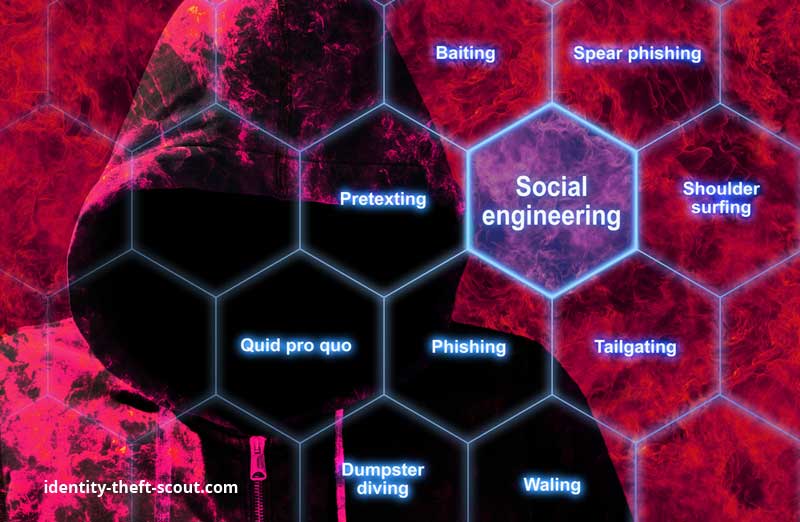
How to prevent social engineering scams? In the world of digitization with increased use of technology across different sectors, industries are witnessing an increase in cybercrimes and cyber security issues than ever before.
There are cyber attackers out there on the loose, who leverage their technical expertise to infiltrate secured networks, computer systems and compromise confidential data.
These tech-savvy breed of malicious actors make it into the headlines all the time for the wrong reasons, thus prompting us to counter their intrusion by investigating and setting up new defense mechanism that will bolster the network securities.
However, there is another set of attackers who adopt a rather different strategy to access and compromise sensitive data. These attackers use social engineering tactics to exploit weak areas found within the organization which is the “human psychology”.
What is a Social Engineering Scam?
Social engineering is a criminal technique of manipulating people into giving confidential information using various channels and mediums like calls, mails or messages etc. They trick you into giving them your passwords or bank details or access your computer to secretly install malicious software and gain confidential data. Attackers prefer using this tactic, for it is easier to exploit your natural inclination to trust than to hack your software.
Types of social engineering attacks to watch-out for
Phishing
Phishing is the most common type of social engineering scam that people fall a prey to these days. It is a type of cyber-attack that uses emails to dupe people and obtain sensitive information. This is either done by sending mails with misleading links that redirect you to suspicious websites or via an attachment, which on downloading secretly installs malicious software in your computer and gets access to your application controls.
They even try to impersonate as an official of a reputed institute or company that you may be connected to, for gaining access to sensitive information. Either ways they try to incorporate a sense of threat, fear or urgency in an attempt to manipulate the user into responding quickly and sharing details.
Pretexting
Pretexting is another form or type of social engineering scam wherein using a good pretext, or a fabricated scenario, the attacker tries to extract confidential information from people. So, in the pretext of asking certain bits of information from the victim, they confirm the identity, and then steal the data and use it to commit identity theft or stage secondary attacks.
The attackers here build a false sense of trust by building a credible story and manipulate people into giving data. One of the most common examples for this would be an attacker impersonating as an HR personnel and in pretext of a job offer, ask the victim to provide a security deposit amount for getting a job or for lining up of interviews in reputed organizations.
Baiting
Baiting which is quite similar to phishing attacks is a type of social engineering scam wherein the attacker promises of an item or good in exchange to lure the victims. They trick the victim or users into handing their login credentials or other details in exchange of some points, cash back, gift voucher or music file downloads.
Tailgating
Tailgating also popularly known as piggybacking is a kind of attack, wherein the attacker tries to tag along with an employee into a restricted zone and get access to the building wherein he can gain sensitive data or information. The attacker typically tries to strike a conversation with employees and use this show of familiarity to get past the security and get access to all the data.
How to Avoid Social Engineering Scam?
In times like this it is extremely easy to get duped for sensitive information or money through a staged social engineering scam. However, here are some ways how one can avoid such scams.
- Always delete mails requesting financial information or passwords. For that matter, even if you get a call or message asking for your details, ignore such calls and messages too.
- Avoid downloading any files or documents received from unknown email ids, for it may contain virus or some sort of software that may get automatically installed and give access to your computer or application in use.
- Reject offering any kind of help or providing information since legitimate companies and organizations do not contact you on phone calls, mail or via messages asking for details. If you did not specifically request for any assistance or initiated any offer of help previously, then there is a high possibility that it may be a scam.
- Keep your spam filters on to avoid falling a prey to malicious activity through your inbox. Adjust your inbox settings and switch on your ’spam filters’ to safeguard yourself.
- Install antivirus software to scan all the attachments you receive via a mail. This will protect you from downloading suspicious files. Install good anti-virus software, firewalls, email filters and keep them up-to-date. Set your operating system to automatically update, or update manually whenever you receive a notice to do so. If possible, use an anti-phishing tool to get alerts on potential risks.
Conclusion
No matter how smart we think we are, we must not underestimate the risk or threat posed to us every now and then online. We must secure our web applications, devices and also be careful of all the dubious calls, messages and mails, and not fall a prey to any type social engineering scams.
Author Bio:
Narendra Sahoo is a director of VISTA InfoSec,, One of the foremost companies in InfoSec Compliance, Assessments and Consulting services providing vendor neutral services in areas such as PCI DSS, PCI PIN, SOC2 Certification and Audit, GDPR, HIPAA, MAS TRM, PDPA, PDPB, VA/PT,Web/Mobile Appsec, Red Team Assessment, etc.


